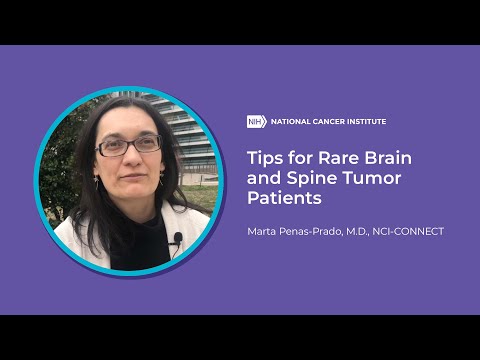A recurrence is when your tumor begins to grow or has come back. It is also often referred to as tumor progression. Even when treatment has finished, in many cases there is always a chance that the tumor will recur.
It is not possible for your doctor to know if or when your tumor will recur. Tumors often come back in the same spot. However, it is possible for a brain and spine tumor to return in another location in the central nervous system (CNS)—or outside the CNS in the case of some rare tumors (for example, medulloblastoma).
It is important to find a doctor who has experience treating your specific tumor type. Your neuro-oncologist and health care team will work with you and your loved ones to create a treatment plan and coordinate your care. Use our network of health care professionals to find an experienced doctor near you and get a second opinion.
Symptoms
Signs and symptoms of a recurrent brain or spine tumor are often the same symptoms you experienced before, but they can feel more pronounced. If you have worsening or new symptoms, talk to your health care team. You can also find strategies to manage your symptoms.
Follow-up Care
It is important to continue being monitored by a neuro- oncologist after completing treatment. This may involve physical and neurologic exams, as well as imaging of your brain or spine. This will help your doctor detect a recurrence and start treatment, if necessary. Depending on your tumor type, the location of the recurrence, and the previous treatment you received, your next treatment may include one or more of the following: surgery, radiation, chemotherapy, joining a clinical trial to test a new treatment.
Feelings
Finding out that your tumor has recurred can cause feelings of shock, anger, sadness, and fear. But this time you have something that you didn’t have before: experience. You’ve already lived through tumor treatment and know what to expect. Treatments may have also improved since you were first diagnosed. New drugs or therapies may be more successful and will help with your treatment or side effects.
Facing a recurrence can be scary and challenging for you and your family. Use these resources to inform your treatment decisions, find support, and guide you through another cancer journey.
Guiding Questions
- Questions to Ask Your Doctor or Surgeon if You Have a Recurrence
- Questions to Ask Your Neurosurgeon
- Questions to Ask Your Doctor about Your Treatment
- Questions to Ask Your Doctor about Clinical Trials
- Questions to Ask Your Doctor about Support
Treatment Resources
- Types of Cancer Treatment
- Side Effect of Cancer Treatment
- Clinical Trials for CNS Tumors
- Complementary and Alternative Medicine



